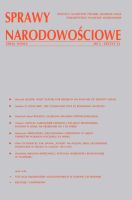„Katastrofa materialna” we wspomnieniach przedstawicielek polskiej arystokracji i ziemiaństwa z kresów
„Material catastrophe” in the memories of three women – members of the polish aristocracy and landed gentry from the polish eastern borderlands
Author(s): Małgorzata OkupnikSubject(s): History
Published by: Instytut Slawistyki Polskiej Akademii Nauk
Keywords: memories; women − members of Polish aristocracy and landed gentry; Polish Eastern Borderlands; Matylda Sapieżyna; Helena Rothowa; Maria Sapieżyna; the esthetics of loss
Summary/Abstract: History has treated cruelly the families of landed gentry and aristocracy who lived in the Polish Eastern Borderland – the eastern provinces of the Second Polish Republic (Kresy). This essay focuses on memories of women, members of the Polish aristocracy and landed gentry from the ¬Kresy, published in the following books: “We and Our Homes” (My i nasze Siedliska) by Matylda née Windisch-Graetz Sapieżyna, “Times, Places, People. Memories from the Eastern Borderlands, 1893-1946” (Czasy, miejsca, ludzie. Wspomnienia z Kresów Wschodnich 1893-1946) by Helena née Jaczynowska Rothowa, and ”My Life, My Times” (Moje życie, mój czas) by Maria née Zdziechowska Sapieżyna. Their memories are not a full historical picture including the complex political and historic context, instead they concentrate on the precise fates of their families in the Kresy (though their presence there was called, not without a reason, a kind of ‘colonization’). The three authoresses present themselves as victims of great politics and changes happening beyond their control. Thus, these three (auto)biographical narrations enter the canon of literature about the eastern frontier and correspond with the canon of ‘the esthetics of loss.’ The analysis demonstrates that in all the books under consideration particular attention has been devoted to the material sphere of everyday life because the female biographers wanted to describe their world in the Kresy in detail and at the same time show how much they had lost.
Journal: Sprawy Narodowościowe
- Issue Year: 2013
- Issue No: 42
- Page Range: 115-128
- Page Count: 14
- Language: Polish

